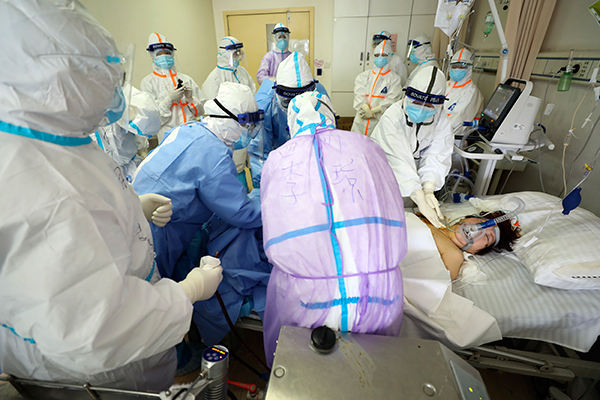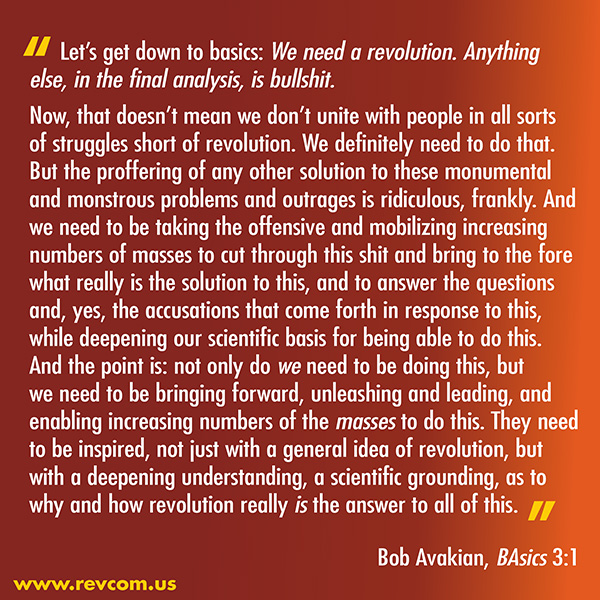Question: Why Does the World Still Lack for Face Masks?
Especially in A World of Mass Production, with Incredible Capacity
Answer: Capitalism-Imperialism.
| revcom.us
Gripped by the coronavirus pandemic, the whole world is confronting a desperate shortage of medical masks to prevent healthcare workers from being sidelined—or killed—by the virus.
An article in U.S. News and World Report (“The Global Effort to Tackle the Coronavirus Face Mask Shortage”) describes an insane situation: countries without stockpiles of masks for a global pandemic that was foreseeable; the vast productive capacity of global capitalism yet unable to produce and supply nearly enough masks; and even the masks that exist bottled up by export bans, not getting where they’re most needed.
For example, it describes a situation where the “dire shortage in China, even in hospitals, was made horrifyingly obvious by the infection of more than 3,000 health care workers. China was driven to try to import masks from many other countries... Italy, the worst-hit country in Europe, is getting 800,000 face masks from South Africa, but it still needs at least ten million more.” (Emphasis added.) China produces half of the world’s face masks in normal circumstances.
Acknowledging hard realities, the article says: “Crises like this one are too large and complex for individual nation-states to tackle and solve on their own.” (Emphasis ours.) And it asks: “How can we compel global businesses to be more fully involved in preparing for the next pandemic and to work with governments at various levels?”
Let’s look at the reality under this system of capitalism-imperialism!
Yes, the “global production chains”1 of this system can produce a lot of goods and services, wealth! But they do not exist and are not organized to produce what humanity needs. They are organized, and driven, to maximize profits for competing large blocs of capital, by “linking” and profiting off the exploitation—and super-exploitation—of people, particularly in the Third World (or “Global South,” as the article calls it).
Capitalist production chains are organized around what is likely to be profitable in the short term, not what the needs of humanity are or may be, nor guided by conscious planning. Actual manufacture and labor-intensive assembly of products often get highly concentrated in low-wage areas, like China, Bangladesh, etc. In crisis situations like the COVID-19 pandemic, production disruptions of face masks in a single country like China can then lead to massive shortfalls globally—when they are most needed! (While there have been some short-term adjustments to re-gear factories elsewhere to manufacture face masks, along with re-starting production in China, a lot more is needed to meet forecasted demands—a 40 percent increase in manufacturing.)
Along with this, at a moment when no genuine socialist societies or states exist in the world,2 the national governments of today do not fundamentally exist to meet the needs of humanity—or of “their own” people, for that matter. They essentially serve as instruments of oppressive ruling classes, and are part of the worldwide system of capitalism-imperialism. They compete and are often in conflict with each other, over resources, markets, and control of regions of the world (like the Middle East or South China Sea). They facilitate the expansion—and competitive advantage—of blocs of capital rooted in their country, in competition with that of other countries.
All this has ultimately led to a situation where, as the U.S. News and World Report article recognizes, “In the context of global capitalism, the folly of overlooking the centrality of economic globalization—this time in the form of the global face mask supply chain—in contributing and responding to a global health crisis is now obvious.”
In stark contrast, IMAGINE A WORLD where the economy, production infrastructure, and people’s efforts, knowledge and creativity are organized—globally—around the needs of humanity. Unconstrained by the driving needs of accumulating profit, and by the competition and conflict of blocs of capital and nation-states. Imagine a world in which forethought and conscious planning are given to preparing for disasters, and where—when they happen—the economy and society are reoriented, and people led and unleashed to create and surge help to the places that are hardest hit and where it is most needed.
That world is possible, but it will take an ACTUAL Revolution—Nothing Less! to wrench it out of today’s nightmares, and out from under the grip of this system of capitalism-imperialism.
1. Global production chains—or supply chains—describe the worldwide network of people and activities involved in the production, handling, and distribution of materials and products or services under this system. For something like a laptop, this may involve aspects from the supply of raw materials like the rare mineral coltan mined in Congo, design and marketing in California, silicon chips and electronic manufactured in Taiwan and other countries, labor-intensive assembly in sweatshops in China, and shipping worldwide, most container ships using high-polluting low-cost fuel oil in international waters. [back]
2. China is a capitalist state, despite characterizations to the contrary coming from not only the Chinese government but also mainstream intellectuals, media, and others. For more, see You Don’t Know What You Think You “Know” About…The Communist Revolution and the REAL Path to Emancipation: Its History and Our Future, an interview with Raymond Lotta. [back]

The vast productive capacity of global capitalism is yet unable to produce and supply nearly enough masks even where they are most needed, like in this ICU in Wuhan, China. Photo: AP
What If the World Doesn't Have To Be This Way?

Get a free email subscription to revcom.us:


